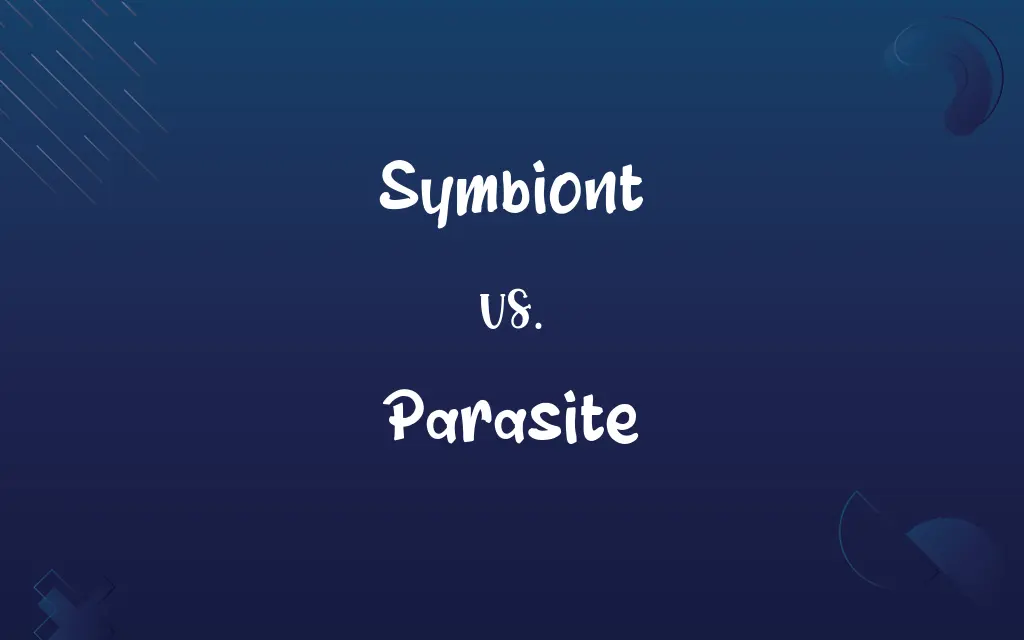Symbiont vs. Parasite: Know the Difference

By Shumaila Saeed || Updated on December 29, 2023
A symbiont is an organism that lives in a mutually beneficial relationship with another organism; a parasite lives off another organism, harming it.

Key Differences
Symbionts engage in relationships that benefit both organisms, while parasites derive benefits at their host's expense, often causing harm.
Shumaila Saeed
Dec 29, 2023
Symbiotic relationships are typically mutualistic, enhancing the survival of both parties, whereas parasitic relationships are exploitative, benefiting the parasite to the detriment of the host.
Shumaila Saeed
Dec 29, 2023
Examples of symbionts include gut flora in humans that aid digestion, while parasites include tapeworms that feed on a host's nutrients.
Shumaila Saeed
Dec 29, 2023
Symbionts may provide essential functions like nutrient cycling for their hosts, whereas parasites often weaken their hosts and can cause diseases.
Shumaila Saeed
Dec 29, 2023
The nature of a symbiont's relationship is cooperative and interdependent, while a parasite's relationship is predatory and one-sided.
Shumaila Saeed
Dec 29, 2023
ADVERTISEMENT
Comparison Chart
Relationship Nature
Mutualistic, beneficial to both parties
Exploitative, harmful to the host
Shumaila Saeed
Dec 29, 2023
Impact on Host
Generally positive, enhancing survival
Negative, often causing harm or disease
Shumaila Saeed
Dec 29, 2023
Dependency
Interdependent for mutual benefits
Dependent on host for survival
Shumaila Saeed
Dec 29, 2023
Overall Effect
Enhances host's functions and well-being
Depletes host's resources, weakens it
Shumaila Saeed
Dec 29, 2023
ADVERTISEMENT
Symbiont and Parasite Definitions
Symbiont
An organism that lives closely with another to the benefit of both.
Certain bacteria in the human gut are important symbionts aiding digestion.
Shumaila Saeed
Dec 29, 2023
Parasite
An organism that lives in or on another organism (its host) and benefits at the host's expense.
Tapeworms are parasites that live in the intestines of their hosts.
Shumaila Saeed
Dec 29, 2023
Symbiont
An organism that engages in a cooperative relationship with another species.
Bees and flowers are symbionts, with bees pollinating flowers and gaining nectar.
Shumaila Saeed
Dec 29, 2023
Parasite
A life form that feeds on, and often harms, its host.
The parasite latched onto the fish, drawing nutrients from it.
Shumaila Saeed
Dec 29, 2023
Symbiont
An organism in a mutually beneficial relationship with another organism.
The clownfish and sea anemone are symbionts, protecting each other.
Shumaila Saeed
Dec 29, 2023
ADVERTISEMENT
Parasite
An organism that depends on another for survival, usually harming it.
Malaria is caused by a parasite transmitted by mosquitoes.
Shumaila Saeed
Dec 29, 2023
Symbiont
A participant in symbiosis, a close and often long-term interaction.
In coral reefs, algae act as symbionts, providing energy through photosynthesis.
Shumaila Saeed
Dec 29, 2023
Parasite
An organism that exploits its host for resources, often causing disease.
The parasitic plant drew nutrients from the roots of its host plant.
Shumaila Saeed
Dec 29, 2023
Symbiont
A biological partner in a mutually advantageous association.
The mycorrhizal fungi are symbionts, helping plants absorb nutrients.
Shumaila Saeed
Dec 29, 2023
Parasite
(Biology) An organism that lives and feeds on or in an organism of a different species and causes harm to its host.
Shumaila Saeed
Oct 19, 2023
Parasite
One who habitually takes advantage of the generosity of others without making any useful return.
Shumaila Saeed
Oct 19, 2023
Parasite
(pejorative) A person who lives on other people's efforts or expense and gives little or nothing back.
Shumaila Saeed
Oct 19, 2023
Parasite
(biology) An organism that lives on or in another organism of a different species, deriving benefit from living on or in that other organism, while not contributing towards that other organism sufficiently to cover the cost to that other organism.
Lice, fleas, ticks and mites are widely spread parasites.
Shumaila Saeed
Oct 19, 2023
Parasite
(historical) A retainer or companion of an ancient Celtic warrior, who praised him in song or poetry at gatherings; a bard.
Shumaila Saeed
Oct 19, 2023
Parasite
(aviation) A component of a composite aircraft which is carried aloft and air-launched by a larger carrier aircraft or mother ship to support the primary mission of the carrier.
Shumaila Saeed
Oct 19, 2023
Parasite
One who frequents the tables of the rich, or who lives at another's expense, and earns his welcome by flattery; a hanger-on; a toady; a sycophant.
Thou, with trembling fear,Or like a fawning parasite, obey'st.
Parasites were called such smell-feasts as would seek to be free guests at rich men's tables.
Shumaila Saeed
Oct 19, 2023
Parasite
A plant obtaining nourishment immediately from other plants to which it attaches itself, and whose juices it absorbs; - sometimes, but erroneously, called epiphyte.
Shumaila Saeed
Oct 19, 2023
Parasite
An animal which lives during the whole or part of its existence on or in the body of some other animal, feeding upon its food, blood, or tissues, as lice, tapeworms, etc.
Shumaila Saeed
Oct 19, 2023
Parasite
An animal or plant that lives in or on a host (another animal or plant); the parasite obtains nourishment from the host without benefiting or killing the host
Shumaila Saeed
Oct 19, 2023
Parasite
A follower who hangs around a host (without benefit to the host) in hope of gain or advantage
Shumaila Saeed
Oct 19, 2023
Parasite
A species that lives on or in a host and gets its food from or at the expense of its host.
Fleas are common parasites on domestic animals.
Shumaila Saeed
Dec 29, 2023
Repeatedly Asked Queries
What is a symbiont?
A symbiont is an organism that lives in a mutually beneficial relationship with another organism.
Shumaila Saeed
Dec 29, 2023
Are all parasites harmful?
Most parasites are harmful to their hosts, but the degree of harm can vary.
Shumaila Saeed
Dec 29, 2023
Can a symbiont relationship turn parasitic?
Yes, in some cases, symbiotic relationships can become parasitic under certain conditions.
Shumaila Saeed
Dec 29, 2023
Is symbiosis always beneficial?
Symbiosis is generally beneficial to both parties involved, but the benefits may vary in degree.
Shumaila Saeed
Dec 29, 2023
How does a parasite affect its host?
A parasite negatively affects its host by feeding on it or using its resources, often causing harm.
Shumaila Saeed
Dec 29, 2023
Are parasites a type of symbiont?
Parasites are a type of symbiont, specifically engaging in parasitism, which is a harmful form of symbiosis.
Shumaila Saeed
Dec 29, 2023
How do parasites reproduce?
Parasites reproduce in various ways, often within or on their hosts.
Shumaila Saeed
Dec 29, 2023
What is the impact of parasites on ecosystems?
Parasites can impact ecosystems by affecting host populations and altering food webs.
Shumaila Saeed
Dec 29, 2023
Can a parasite live independently?
Most parasites are dependent on their hosts for at least part of their lifecycle.
Shumaila Saeed
Dec 29, 2023
Can symbionts harm their hosts?
While rare, some symbionts can become harmful under certain conditions.
Shumaila Saeed
Dec 29, 2023
Are there human parasites?
Yes, humans can host various parasites like tapeworms, lice, and malarial parasites.
Shumaila Saeed
Dec 29, 2023
What are examples of symbionts in nature?
Examples include the relationship between bees and flowers, and gut flora in humans.
Shumaila Saeed
Dec 29, 2023
Are symbionts always two different species?
Yes, symbiosis typically involves close interaction between two different species.
Shumaila Saeed
Dec 29, 2023
How do hosts defend against parasites?
Hosts defend against parasites through immune responses and other biological mechanisms.
Shumaila Saeed
Dec 29, 2023
How do symbionts communicate?
Symbionts communicate through chemical signals, physical contact, or other biological interactions.
Shumaila Saeed
Dec 29, 2023
Can humans be symbionts?
Yes, humans can be symbionts, such as in our relationship with beneficial gut bacteria.
Shumaila Saeed
Dec 29, 2023
Do parasites always cause diseases?
Many parasites cause diseases, but not all necessarily lead to illness in the host.
Shumaila Saeed
Dec 29, 2023
What is an obligate parasite?
An obligate parasite is one that cannot complete its life cycle without exploiting a suitable host.
Shumaila Saeed
Dec 29, 2023
Can symbiotic relationships evolve?
Yes, symbiotic relationships can evolve over time, adapting to environmental changes.
Shumaila Saeed
Dec 29, 2023
Do symbionts evolve together?
Symbionts often co-evolve, adapting to each other's presence and needs.
Shumaila Saeed
Dec 29, 2023
Share this page
Link for your blog / website
HTML
Link to share via messenger
About Author
Written by
Shumaila SaeedShumaila Saeed, an expert content creator with 6 years of experience, specializes in distilling complex topics into easily digestible comparisons, shining a light on the nuances that both inform and educate readers with clarity and accuracy.








































































